|
|
|
Sort Order |
|
|
|
Items / Page
|
|
|
|
|
|
|
| Srl | Item |
| 1 |
ID:
132961
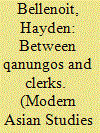

|
|
|
|
|
| Publication |
2014.
|
| Summary/Abstract |
This paper argues that our understanding of the transition to colonialism in South Asia can be enriched by examining the formation of revenue collection systems in north India between 1750 and 1850. It examines agrarian revenue systems not through the prism of legalism or landholding patterns, but by looking at the paper and record-based mechanisms by which wealth was actually extracted from India's hinterlands. It also examines the Kayastha pensmen who became an exponentially significant component of an Indo-Muslim revenue administration. They assisted the extension of Mughal revenue collection capabilities as qanungos (registrars) and patwaris (accountants). The intensity of revenue assessment, extraction and collection had increased by the mid 1700s, through the extension of cultivation and assessment by regional Indian kingdoms. The East India Company, in its agrarian revenue settlements in north India, utilized this extant revenue culture to push through savage revenue demands. These Kayastha pensmen thus furnished the 'young' Company with the crucial skills, physical records, and legitimacy to garner the agrarian wealth which would fund Britain's Indian empire. These more regular patterns of paper-oriented administration engendered a process of 'bureaucratization' and the emergence of the modern colonial state.
|
|
|
|
|
|
|
|
|
|
|
|
|
|
|
|
| 2 |
ID:
124507
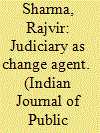

|
|
|
|
|
| Publication |
2012.
|
| Summary/Abstract |
The Indian Judiciary has completed 60 years of its existence and has made long lasting contribution to the system of governance that has impacted the life of the people and the nation. In many ways, it has impacted the nature, scope and processes of public governance and can claim credit for expanding the meaning of the constitution in favor of different segments, especially the poor, of the society. It has strengthened Indian federation, catalyzed goal achievement, deepened democracy and defended people against excesses of the State. It has acted as a promoter of peace, cordiality and balance and coordination between different organs of the government. At one time it was thought that the role of judiciary is only to interpret the laws and the regulations and provide judgements exclusively from the legal point of view. This perspective has undergone a sea change in the recent times. Envisaging the role of the supreme court of India, the first Chief Justice of India, Justice Kania said:
"The Supreme Court would declare and interpret the law of the land, and with the tradition of Indian judiciary, it would work in no spirit of formal or barren legalism, within the limits prescribed by the constitution. The court, as part of the federal system and as the defender of democracy, is responsive to the changes in Indian society
|
|
|
|
|
|
|
|
|
|
|
|
|
|
|
|
| 3 |
ID:
095665
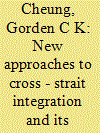

|
|
|
| 4 |
ID:
114903
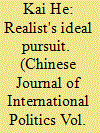

|
|
|
|
|
| Publication |
2012.
|
| Summary/Abstract |
It is no exaggeration to say that Yan Xuetong's Ancient Chinese Thought,
Modern Chinese Power is a path-breaking project that integrates ancient
Chinese philosophy, Pre-Qin history, and contemporary International
Relations (IR) theory. Although Yan has not introduced a new grand
theory of IR in the book per se, he has paved a fresh theoretical and intellectual path to reforming current, western-philosophy-and-history-based IR
theory. If scholars follow Yan's guidance and approach as laid out in the
book, it will be no surprise to see developed more than one new IR theory.
|
|
|
|
|
|
|
|
|
|
|
|
|
|
|
|
| 5 |
ID:
126429
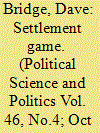

|
|
|
|
|
| Publication |
2013.
|
| Summary/Abstract |
Many political science subfields use classroom simulations. Public law, however, suffers from a lack of such activities. Many mock trials exist, but these games focus on jurisprudence and not on the more institutional aspects of the subfield. This article presents the Settlement Game, an original simulation that takes 15 minutes to complete and helps teach important institutional theories such as adversarial legalism, "bargaining in the shadow of the law," and "haves" versus "have-nots" concepts heretofore overlooked by the simulations literature. I introduce relevant theories and describe how the simulation works, discussing preclass assignments, its operation, and debriefing about its connection to theory. I close with comments about assessment of students and explain why the Settlement Game is useful.
|
|
|
|
|
|
|
|
|
|
|
|
|
|
|
|
| 6 |
ID:
113813


|
|
|
|
|
| Publication |
2012.
|
| Summary/Abstract |
The world has now experienced what could be regarded as 20 years of Institutional Liberalism: the dominance of the view that cooperation in world politics can be enhanced through the construction and support of multilateral institutions based on liberal principles. E. H. Carr was famously skeptical of liberalism as he understood that tradition. This essay, prepared originally as the E. H. Carr Lecture at Aberystwyth University, interrogates Institutional Liberalism through a lens provided by Carr's most famous book on international relations, The Twenty Years' Crisis. It points out three trends since the 1990s that may be associated with Institutional Liberalism: increasing legalization; trends toward more legalism and moralism; and a decline in the coherence of some international regimes. Reviewing these trends in light of Realist critiques of liberalism, the essay rejects Realism as a good moral or practical guide to world politics, but reaffirms the value of the Realist view that institutions depend on structures of power and interests. Increases in legalization, legalism and moralism reflect a fusion of the social purpose of liberal democracies with their unprecedented geopolitical power since 1991. But declines in the coherence of international regimes reflect a greater divergence of interests, weighted by power. All international institutions are flawed and in some ways precarious, but strengthening them in ways that reflect legitimate social purposes remains a major challenge for our time.
|
|
|
|
|
|
|
|
|
|
|
|
|
|
|
|
| 7 |
ID:
178492
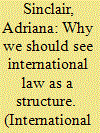

|
|
|
|
|
| Summary/Abstract |
This article identifies how three dominant ideas of international law (as a process, an institution and a practice) see its agency, concluding that all three share a reluctance to see international law as doing anything more than enabling the operation of other actors, forces or structures. This article argues that we should see international law as a structure because it possesses both the surface structure of rules, principles, processes, personnel and material elements of the international legal system and a deep structure of values that sits deep within our subconscious. As Shklar’s idea of legalism shows us, legalism plays a powerful role in shaping all our understandings of ourselves and the world that surrounds us. Seeing international law as a structure enables us to see how it locates actors within a social hierarchy and how it behaves in similar ways to recognised structures like capitalism and racism.
|
|
|
|
|
|
|
|
|
|
|
|
|
|
|
|
|
|
|
|
|